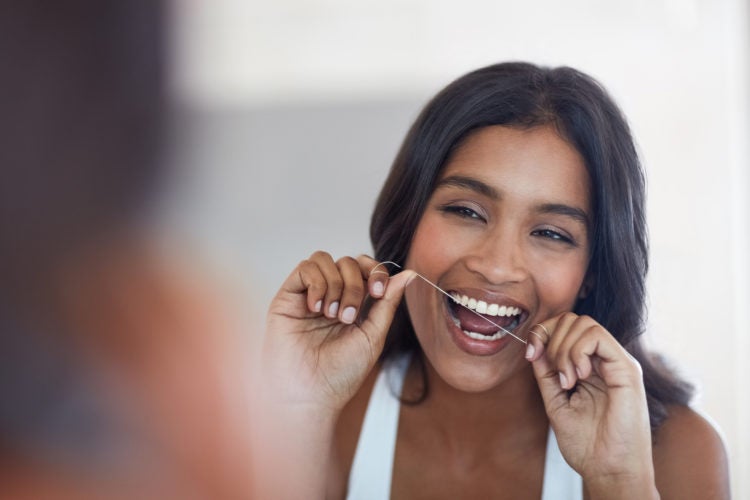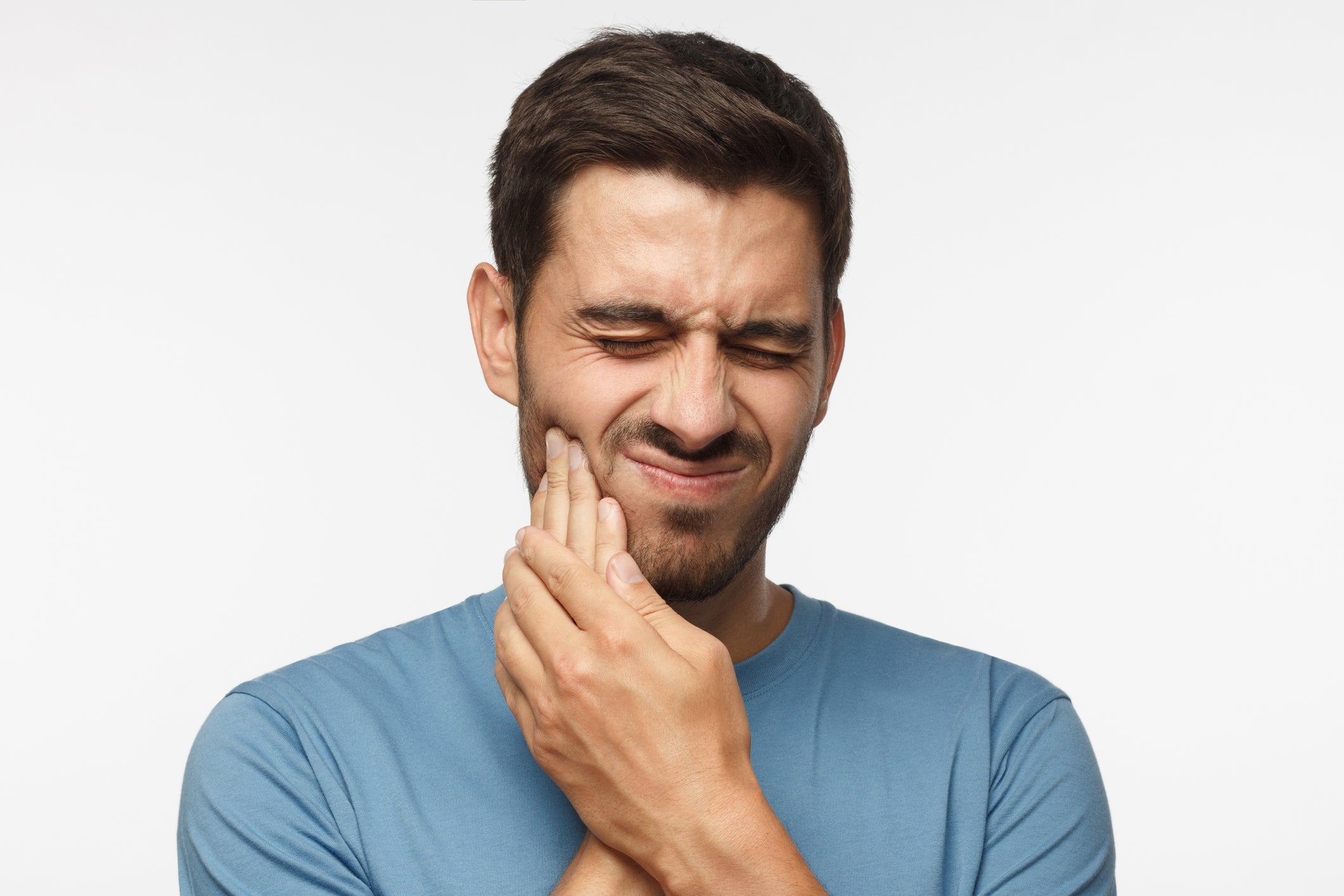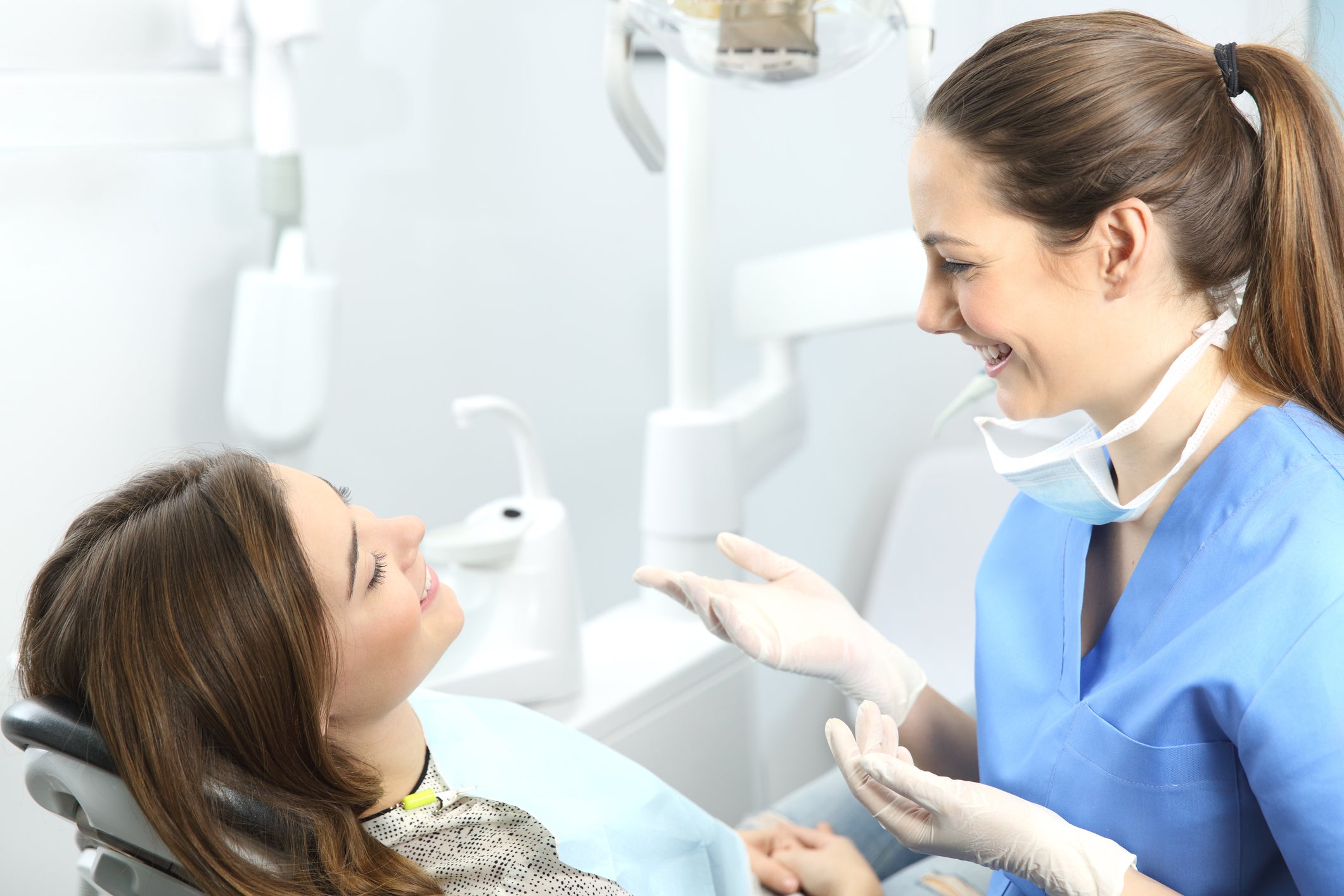-
Invisalign® versus Braces

Are you trying to decide between Invisalign® and braces? The first modern braces were invented early in the 19th century, and since then, there have been great strides in the field of orthodontia. Invisalign® is one of those strides, offering people the opportunity to correct their teeth without the look of traditional braces. Which method is better? The answer depends on many factors, from the severity of your issues to how quickly the teeth need to be shifted. How do you make the decision?
- Invisalign® is more than just invisible aligners. There will also be “attachments” glued onto the teeth, which will be either opaque or tooth-colored and come in a variety of shapes and sizes. If you have crowding, you’ll have to have interproximal reduction (IPR), which is a type of shaving of the teeth. Be prepared for this IPR to remove .1-.5mm or more of your tooth enamel, permanently.
- The Invisalign® aligners are a big draw. Not only are they less noticeable to other people than traditional braces because of their transparency, but they’re also removable, which is convenient. You can remove them to eat your meals or clean your teeth, and it’s much easier to thoroughly brush and floss with the aligners out of your mouth. You will change your aligners every week or two, essentially treating your own misalignment.
- Braces move teeth more quickly than Invisalign®. The fastest way to move teeth is with low, continuous force, providing constant stimulation to the ligaments around the roots of your teeth. This is best accomplished with Nickel-Titanium (N.T) arch wire, especially when it’s a type that’s high-grade and treated in a way that allows them to work continuously in a low force, at body temperature. High-tech, self-litigating braces move the teeth fastest, while at the same time using the least amount of force.
- With traditional braces, you’ll also have pieces glued to your teeth. They’ll either be stainless steel, clear polymer or ceramic, and they’ll serve as connectors for the arch wire that will move your teeth into position. Except in rare circumstances, IPR is not used with traditional braces.
- The big drawback of traditional braces is that they cannot be removed. You won’t be able to take them out to eat or clean your teeth, because they’re glued on with a fluoride-infused resin. Good dental hygiene is vital when you have braces, and you will need to see your hygienist every four to six months for your gum health.
At Park 56 Dental Group, we provide personalized, quality dental care in a spa-like environment. We offer pediatric, prosthodontics, endodontics, oral surgery, Invisalign®, emergency, and sedation dentistry, all at the highest level of treatment. We serve the Midtown, Central Park, Upper East Side, Park Avenue, and all surrounding Manhattan and New York areas, with a patient-centered practice that has hours to fit your schedule. Schedule your complimentary consultation today by contacting us online or calling us at (212) 826-2322.
-
How Sports Drinks Could Be Ruining Your Teeth

Do you rely on sports drinks to keep you hydrated when you’re working out or playing sports? Sports drinks are helpful if you’re working out in extreme heat, for an extended period of time, or when you’re working out after you haven’t eaten for a while. Because of the electrolytes and carbohydrates in sports drinks, they’re very useful in replacing nutrients and providing energy in extreme situations. However, there’s research to indicate that regular consumption of sports drinks can be hazardous to your dental health.
A recent study of elite and professional athletes revealed that many of them have substantial dental problems, regardless of good dental hygiene. This study, published in the British Dental Journal, looked at 352 athletes, with 256 of those athletes on track to compete in the 2016 Rio Olympics. Competing across different types of sports, including swimming, cycling, soccer, rowing, hockey, sailing, and athletics, the participants had an average age of 25 years old. Out of the 352, 344 completed a questionnaire regarding their dental hygiene, sugar consumption, whether they smoked or chewed gum, and when they last saw the dentist. Pertinent findings included:
- Most of the athletes brushed their teeth twice a day and saw their dentists regularly.
- 80 percent of the athletes consumed sports drinks while training or competing.
- 58 percent used energy bars, and 70 percent took gels.
The risk of dental problems seemed to be heightened by the changes in the makeup of the athletes’ saliva during and after intense exercise. Sports drinks, energy bars, and gels are marketed without guidance about oral health. While the researchers acknowledged that their findings were limited, especially because they had to rely on the participants’ honesty about their habits, they still concluded that these products have a negative impact on dental health. The sugar the products contain increases the risk of tooth decay, and the acidity of the products increases the risk of erosion. During the dental check-ups of the athletes, the researchers noted high levels of tooth decay and acid erosion.
What does this mean for the general population? Because dental problems are common, the CDC recommends fluoride toothpaste and fluoridated water, thorough brushing and flossing, and regular dentist visits, abstention from smoking and limited alcohol consumption. We would add that it also might be best to stick with water during most exercise periods, rather than hydrating with sports drinks that may damage your teeth.
At Park 56 Dental Group, we provide personalized, quality dental care in a spa-like environment. We offer pediatric, prosthodontics, endodontics, oral surgery, Invisalign®, emergency, and sedation dentistry, all at the highest level of treatment. We serve the Midtown, Central Park, Upper East Side, Park Avenue, and all surrounding Manhattan and New York areas, with a patient-centered practice that has hours to fit your schedule. Schedule your complimentary consultation today by contacting us online or calling us at (212) 826-2322.
-
Dentists Give Their Tips for Getting Their Own Kids to Brush Their Teeth

You eagerly await the arrival of your children’s first teeth and cheer every little pearly white as it emerges. By the time they’re old enough to take care of their dental hygiene on their own, however, getting them to properly do it can be like, well, pulling teeth. How can you get your kids to brush their teeth? Here, we offer some tips from dentists who have mastered the art of getting their own kids to brush.
- Make brushing a family affair. Establish a routine in which everyone brushes their teeth twice a day, for at least 2 minutes each time. From the time they’re little, let your kids see you brushing because children love to imitate their parents. During tooth brushing time, you can demonstrate good techniques and how much toothpaste to use.
- Get a good look. When the kids are small, stand behind them and get them to look up at you. That way, you can look down into their mouths and see all of their teeth when you help them brush.
- Don’t stop reminding them just because they’re older. As long as they’re home, ask them if they’ve brushed their teeth, and talk to them about good dental hygiene and healthy eating. When they leave home, send them care packages that include new toothbrushes, toothpaste, and floss.
- Give it a sniff. If you suspect your small child hasn’t brushed, ask to smell his or her breath for the scent of toothpaste. When your child is a teenager, teach this trick: sniff the floss. Teens are breath-conscious, so teaching them to floss their teeth and then smell the floss is a good way to help them gauge whether their breath is socially acceptable.
- Never give up on the routine. Those two minutes spent brushing are extremely important, so establish the routine and stick to it. If you need to set a timer or play music for two minutes to get your kids into the groove, do what it takes, and keep on doing it until it’s firmly established as a habit. For many kids, being able to brush their teeth themselves is a big accomplishment, so play up that angle and praise your kids for a job well done when you catch them practicing good dental hygiene.
At Park 56 Dental Group, we provide personalized, quality dental care in a spa-like environment. We offer pediatric, prosthodontics, endodontics, oral surgery, Invisalign®, emergency, and sedation dentistry, all at the highest level of treatment. We serve the Midtown, Central Park, Upper East Side, Park Avenue, and all surrounding Manhattan and New York areas, with a patient-centered practice that has hours to fit your schedule. Schedule your complimentary consultation today by contacting us online or calling us at (212) 826-2322.
-
The Main Reason People Stop Flossing and What You Can Do About It

Do you know how important it is to floss? You probably know that regular flossing is important to your oral hygiene, but do you actually do it? According to a recent survey, 31 percent of respondents admit to starting and then stopping flossing. Why do people stop, when they know it’s a good thing to do? Time seems to be the primary factor in the failure to floss.
Is this “no time” argument a reasonable excuse? Out of the people surveyed, only 13 percent floss their teeth after every meal, and for 36 percent of those flossers, this was not a daily habit. 64 percent of people who quit flossing didn’t report problems with their flossing routines, so issues encountered during flossing are unlikely to be the reason for quitting. Of those who did report problems, gum damage was the primary reason, at 33 percent. Lesser problems included teeth damage, ineffective cleaning, infections, and dental work problems. Few survey respondents, only 14 percent, believed flossing to be ineffective.
This survey was conducted by DentaVox, the survey arm of Dentacoin, which is a global organization. Other studies have also found that time considerations impact their flossing habits. In one survey from the United States, for instance, 55 percent of respondents reported that flossing is too time-consuming for them to do it regularly.
Ultimately, even though the excuse is a common one, it doesn’t hold water. Flossing is important to your dental health, and if you don’t make time for flossing, you’re opening yourself up to gum disease, tooth decay, and possibly expensive dental treatments. Isn’t that enough incentive to find the time?
How can people work flossing into their schedules more easily? Start by committing to flossing just once a day. You can work it into your morning or evening routine, but you can also do it just about anywhere. Any time you’re sitting, whether you’re at your desk or watching television, you can use single-use floss holders easily and effectively. If you tend to forget to floss, you might also consider keeping these floss holders beside your toothbrush, so that your memory will be jogged while you’re brushing your teeth.
At Park 56 Dental Group, we provide personalized, quality dental care in a spa-like environment. We offer pediatric, prosthodontics, endodontics, oral surgery, Invisalign®, emergency, and sedation dentistry, all at the highest level of treatment. We serve the Midtown, Central Park, Upper East Side, Park Avenue, and all surrounding Manhattan and New York areas, with a patient-centered practice that has hours to fit your schedule. Schedule your complimentary consultation today by contacting us online or calling us at (212) 826-2322.
-
What is a Root Canal, and When Do You Need One?

Years ago, deep cavities, diseased nerves, and infections almost always required tooth extraction. Today, teeth can often be repaired and saved thanks to endodontic treatment, also known as a root canal. Learn more about this procedure and how to tell when you might need one.
What is the Purpose of a Root Canal?
The innermost layer of your teeth, known as the pulp, is susceptible to infection. The purpose of a root canal is to remove the infected pulp and the nerves running through it. This helps prevent further complications and restores a healthy, pain-free mouth.
Without a root canal, an infected tooth may develop an abscess. This can be quite painful and puts you at risk of losing your tooth as bacteria damage the bone that connects your tooth to your jaw.
What Does a Root Canal Entail?
The treatment typically takes one to two office visits to complete. Contrary to popular belief, getting a root canal is not excruciatingly painful. In fact, similar to having a tooth extracted, your dentist will use a numbing agent to ensure you hardly feel a thing.
Before the root canal begins, your dentist will take X-rays to help assess the infected tooth and surrounding bone. Then, a local anesthetic is applied to keep you comfortable.
During the treatment, your dentist drills an opening into the tooth through which the pulp and nerves are removed. Don’t worry; taking out the nerve doesn’t affect your tooth’s function—it simply eliminates your pain.
Finally, the inside of the tooth is thoroughly cleaned and filled with a rubber-like dental composite material to seal the tooth against future infection. If an extensive amount of tooth had to be removed, your dentist might suggest placing a crown to protect against cracking. This may need to take place at a follow-up visit.
In the days following your root canal, your tooth and the surrounding area could feel sensitive. You may be advised to take over-the-counter pain relievers until the discomfort passes. You might also receive a prescription for antibiotics to prevent any residual infection from spreading.
As long as you take proper care of your teeth with daily brushing and flossing and routine trips to the dentist, the results of your root canal should last a lifetime.
When Do You Need a Root Canal?
A root canal may be needed if the pulp deep within your tooth becomes inflamed, infected, or damaged. If you experience any of these symptoms, visit your dentist right away to discuss the possibility of a root canal:
- Toothache (mild to severe)
- Pain when you bite down
- Sensitivity to temperature extremes
- Cracked or fractured tooth
- Discolored tooth
- Swollen, tender gums or drainage of pus
Whether you need a root canal or another form of restorative dentistry, Park 56 Dental can help. Our experienced endodontist specializes in pain-free root canal procedures. Contact our dentist office in NYC at (212) 826-2322 to schedule your consultation today.
-
What Causes Snoring? Solutions for Better Sleep

If your partner snores or your partner has complained that you snore, you may be on the lookout for ways to treat this problem. Occasional snoring is normal and nothing to be concerned about. However, chronic snoring may be a symptom of an underlying health problem that requires treatment.
Causes of Snoring
Periodic snoring may be caused by consuming alcohol close to bedtime, taking sleep aids, or sleeping on your back. Other causes include being overweight or having a deviated nasal septum or narrow airway.
Obstructive sleep apnea (OSA) is another possible reason for chronic snoring. This sleep disorder causes breathing to slow or stop five or more times per hour of sleep. The reduction in breathing signals the body to wake up, which may result in a loud gasping or snorting sound.
People with sleep apnea don’t just disrupt their partner with loud snoring—they also often struggle with fatigue, morning headaches, and difficulty concentrating. Sleep apnea can also cause high blood pressure, increase the risk of stroke, and lead to sexual dysfunction.
Treatments for Sleep Apnea
If you or a loved one snores loudly and struggles with daytime symptoms associated with obstructive sleep apnea, rest assured that solutions are out there! One option commonly recommended by doctors is to use a continuous positive airway pressure (CPAP) machine. While this may be the only effective option for treating severe OSA, patients with mild to moderate sleep apnea may benefit from wearing an oral appliance during sleep.
Oral appliances for sleep apnea resemble mouth guards worn to stop nighttime teeth grinding. The biggest difference is that oral appliances for sleep apnea are designed to hold your bottom jaw forward slightly. This helps prevent your tongue from relaxing and blocking your airway as you sleep.
Benefits of Oral Appliance Therapy
Many patients prefer using a non-obtrusive oral appliance to treat sleep apnea instead of a CPAP machine. Consider the many benefits of this option:
- Comfortable and simple to wear
- Discrete and easy to transport when traveling
- Easy to clean and care for
- Affordable
Get Solutions for Better Sleep from Park 56 Dental
To take full advantage of oral appliance therapy for sleep apnea, you need a custom device made to fit your mouth. The team at Park 56 Dental is happy to meet with you to discuss your snoring concerns. We will perform a series of tests to diagnose your condition and recommend the proper treatment. This may include a custom oral appliance, lifestyle changes, and more.
If we determine that a custom oral appliance can help you, we’ll fabricate one based on an impression of your teeth. This allows the device to fit your mouth without compromise for the best possible outcome.
The “Sleep Better” Team at Park 56 Dental can offer solutions to help you improve your quality of life. Contact us at (212) 826-2322 today to schedule a consultation at our NYC dentist office, and your journey to a more restful sleep will begin!
-
How Often Should You Visit the Dentist?

There haven’t always been guidelines for how often you should visit the dentist. As recently as 50 years ago, many dental professionals focused on restoring smiles rather than keeping them healthy in the first place.
Then, dental and health organizations began to rally around the idea of setting standards for preventative dentistry. It is upon these standards—and the continuing evolution of dental care and advice—that dentists operate today.
Visit the Dentist Every 6 Months
The general rule of thumb is to visit the dentist every six months. This timeframe allows your teeth to benefit from frequent professional cleanings that can prevent gum disease and cavities.
With no evidence to work from, early dental and health organizations made their “best guess” when they recommended that people see the dentist twice a year. The advice ended up being spot on! Some of the first publicized references to this recommendation were found in early Pepsodent ads, such as this one from 1931, which advises customers to “use Pepsodent twice a day—see your dentist twice a year.”
Even if you take great care of your teeth at home—by brushing every morning and night, and never forgetting to floss each day—you still need to see a dentist regularly. First of all, those tartar stains that form on your teeth can only be removed with professional dental tools.
Plus, there’s always the possibility of developing cavities, gum disease, or oral cancer, which don’t exhibit symptoms in their early stages. Frequent visits to the dentist give you a chance to uncover these problems and reverse them while they’re still in a manageable stage.
Consider Oral Hygiene, Eating Habits & Medical Conditions
While seeing the dentist every six months is a good recommendation for most people, it doesn’t apply to everyone. For instance, some individuals with a spotless dental record, flawless oral hygiene, and a healthy diet have a low risk for oral health problems. They may do just fine seeing the dentist only once a year.
Other people have a higher-than-average risk for cavities, gum disease, and oral cancer. We recommend that the following groups visit the dentist more frequently:
- Smokers
- People prone to cavities or plaque buildup
- Periodontal disease patients
- Pregnant women
- Diabetics
- People with bacterial infections or weak immune systems
- People dealing with illness or high stress
These individuals may need to visit the dentist every three or four months for a short time, for several years, or throughout their entire life. More frequent dentist visits help to fight off infections, treat changes in the mouth, and prevent certain situations or lifestyle choices from causing more severe health problems.
Park 56 Dental is ready to serve as your dentist in NYC! At your next appointment, be sure to ask for advice about what dental cleaning schedule you should follow. For answers to your remaining questions, or to schedule a visit, please contact us at (212) 826-2322 today.
-
Caring for Your Braces

If you have invested in braces to straighten your teeth, it’s clear that having a healthy, beautiful smile is important to you. The trouble is that traditional braces make dental hygiene a bit trickier than usual. To help ensure your teeth don’t succumb to cavities while you’re straightening your smile, follow these tips to care for your braces.
Brush with Care
Food particles and plaque tend to accumulate under and around the brackets and wires of your braces. With the following brushing techniques, you can sweep away debris to help keep your mouth clean and cavity-free:
- Remove elastics, bands, and any other removable parts of your braces.
- Clean around the wires and brackets with a soft-bristled toothbrush. Start by holding your toothbrush at a 45-degree angle from the gum line. Then, tilt the bristles as needed to sweep away even the most stubborn particles.
- Brush for two minutes twice a day. Aim to spend 30 seconds in each quadrant of your mouth.
- Rinse with tap water, and examine your teeth and braces in the mirror. Check for any lingering food particles that require a little more attention.
- If you don’t feel like your manual toothbrush is doing a thorough enough job, consider investing in an electric toothbrush. Look for one with a round head and V-shaped bristles designed for use with braces.
Remember to Floss
Flossing once a day is important for everyone, including people with braces. Unfortunately, the wires make it difficult to floss between your teeth along the gum line.
One solution is to use a floss threader. This makes it easier to feed the floss under each wire. We also recommend using waxed floss, which is less likely to get caught and shredded up in your braces. You can also use self-threading floss, which features a stiffened tip that speeds up the process of flossing with braces or permanent retainers.
No matter which method you use, thread the floss carefully under the main wire of your braces before passing it through your teeth. Be careful not to snap the floss—simply move it up and down slowly against each side of the tooth. Then, remove the floss and re-thread it through the next wire. Repeat this process until you have flossed between all your teeth.
Schedule Follow-Up Appointments
Visit your orthodontist for routine checkups and adjustments to your braces. This is what allows your teeth to continue shifting into the ideal position. Also, keep up with regular cleanings and oral exams with your regular dentist to keep your mouth healthy and catch cavities early. You may also receive more useful tips for brushing and flossing with braces.
Traditional braces aren’t right for everyone. If you’re interested in finding out what Invisalign has to offer, please contact Park 56 Dental in NYC at (212) 826-2322. We’ll help you get the beautiful smile you’ve always wanted without metal braces!
-
What You Need to Know About Getting Dentures

Dentists work hard to save their patients’ natural teeth whenever possible. However, if yours are severely damaged or decayed, tooth extractions may be necessary. This is the first step toward restoring the appearance of your smile and making it easier to speak and eat. The next step is to choose a tooth replacement option.
Dentures are a popular choice, especially if you’ve lost all your teeth. Dentures are removable appliances that make your teeth look healthy and function naturally. You can smile, talk, and chew with confidence while wearing properly fitted dentures.
If you’re considering different tooth replacement options, here’s everything you need to know about getting dentures.
Types of Dentures
The most common choice is a conventional denture, which is fully removable and made to replace all your teeth. To prepare for conventional dentures, you will need to have any remaining teeth removed and allow your gums to heal before being fitted, which may take a few months.
Because of the delay in making conventional dentures, you may have the option of inserting immediate dentures the same day your teeth are extracted. This way, you aren’t left without teeth during the healing period.
If possible, your dentist will preserve some of your natural teeth to provide stability for your dentures while reducing the deterioration of your jawbone. In this situation, your dentist may recommend overdentures, which are complete or partial dentures that sit on top of or attach to your remaining natural teeth. The added support makes overdentures less likely to become unstable or require refitting.
Wearing Dentures
For the first few weeks, wearing new dentures may feel awkward. You might experience minor irritation or soreness along with increased saliva flow. These problems should dissipate as you become accustomed to wearing your dentures. If any problems persist, tell your dentist at a follow-up appointment so the necessary adjustments can be made.
Caring for Your Dentures
Good oral care continues to be important, even if your teeth have been replaced with dentures. Here’s what to do:
- Remove your dentures and rinse them with water to dislodge loose food particles.
- Gently brush all surfaces of the dentures with a soft bristle toothbrush and a non-abrasive cleanser.
- Store your dentures in a cup of water when you’re not wearing them to prevent warping.
- Brush your gums, cheeks, tongue, and the roof of your mouth every morning before putting your dentures in to stimulate circulation and remove plaque. Brushing also reduces the risk of oral irritation and bad breath.
- You may choose to apply adhesive to improve the stability of your dentures. Use a product your dentist recommends, and follow the directions carefully for the best results.
Dentures are just one of several options for replacing missing teeth. If you have a gap in your smile, visit Park 56 Dental in NYC today. We’ll discuss whether dentures are right for you and explain any alternatives you’re interested in. Give us a call at (212) 826-2322 to get started!
-
The Importance of Regular Dentist Visits

While brushing and flossing at home every day is a critical part of maintaining a healthy mouth, these steps aren’t enough to keep tooth and gum problems at bay forever. For thorough preventative care and treatment, you need help from a dental professional. Here’s a look at just how important dentist visits are.
Your dentist checks for cavities
To do this, most dentists take X-rays of your teeth. This creates a clear picture of what’s going on in your mouth, even under the gum line. If a cavity is developing, X-rays tell the dentist exactly where it’s located. This way, you can get a filling before the decay spreads and causes more trouble.
Your dentist removes tartar build-up
Every day, a sticky, clear layer of plaque forms on your teeth. You can remove plaque by brushing twice a day. If any is left behind, it hardens into a tooth-staining substance called tartar, or calculus. Only a dentist using special tools can remove tartar from your teeth, a process known as scaling.
Your dentist professionally cleans your teeth
Motored tools and a polishing agent provide a more thorough cleaning than what you can achieve at home. The dentist finishes the job by flossing between your teeth. Your mouth will feel extra clean after all the plaque, tartar, and surface stains have been removed.
Your dentist checks your gums
Healthy gums are just as important as healthy teeth. During your visit, the dentist will use a periodontal probe to measure the space between your teeth and gums. Shallow pockets indicate healthy gums, while deep spaces could mean you have gum disease. Catching this condition in its earliest stage, known as gingivitis, gives you a chance to reverse it. However, if you skip too many dentist visits, your condition could progress to periodontal disease, which can only be maintained or cured with pocket reduction surgery.
Your dentist checks for oral cancer
A careful examination of your tongue, throat, neck, and the inside of your cheeks can reveal swelling, redness, or signs of cancer. Receiving an early diagnosis offers the best chance of making a full recovery, which you can only do if you visit the dentist regularly.
Your dentist provides personalized advice to help you take care of your smile
If you struggle with poor gum health or teeth that stain easily, your dentist can recommend specific products or procedures that may help. Implementing this personalized, expert advice can help you keep your teeth and gums healthy between dentist visits.
Clearly, there are some things you can’t do without your dentist’s help. We recommend visiting Park 56 Dental in NYC at least once every six months for the important dental services you need. Our experienced dentists will take good care of your smile! To learn more about our services, or to schedule an appointment, please call us at (212) 826-2322 today.
RECENT POSTS
categories
- Uncategorized
- Cosmetic Dentistry
- Veneers
- Healthier Teeth
- Teeth Whitening
- Dental Health
- Video
- Dental Emergencies
- Invisalign
- Dental Implants
- Root Canal
- Sedation Dentistry
- Infographic
- Dental Crowns and Bridges
- Dental Anxiety
- Gum Disease
- COVID-19
- Bad Breath
- New York Dentist
- Cut out sugar
- General Dentistry
- Oral Health
- Oral Cancer
- Dry Mouth
- Gum Health
- Toothache
- Dental Sealants
- Cavities
